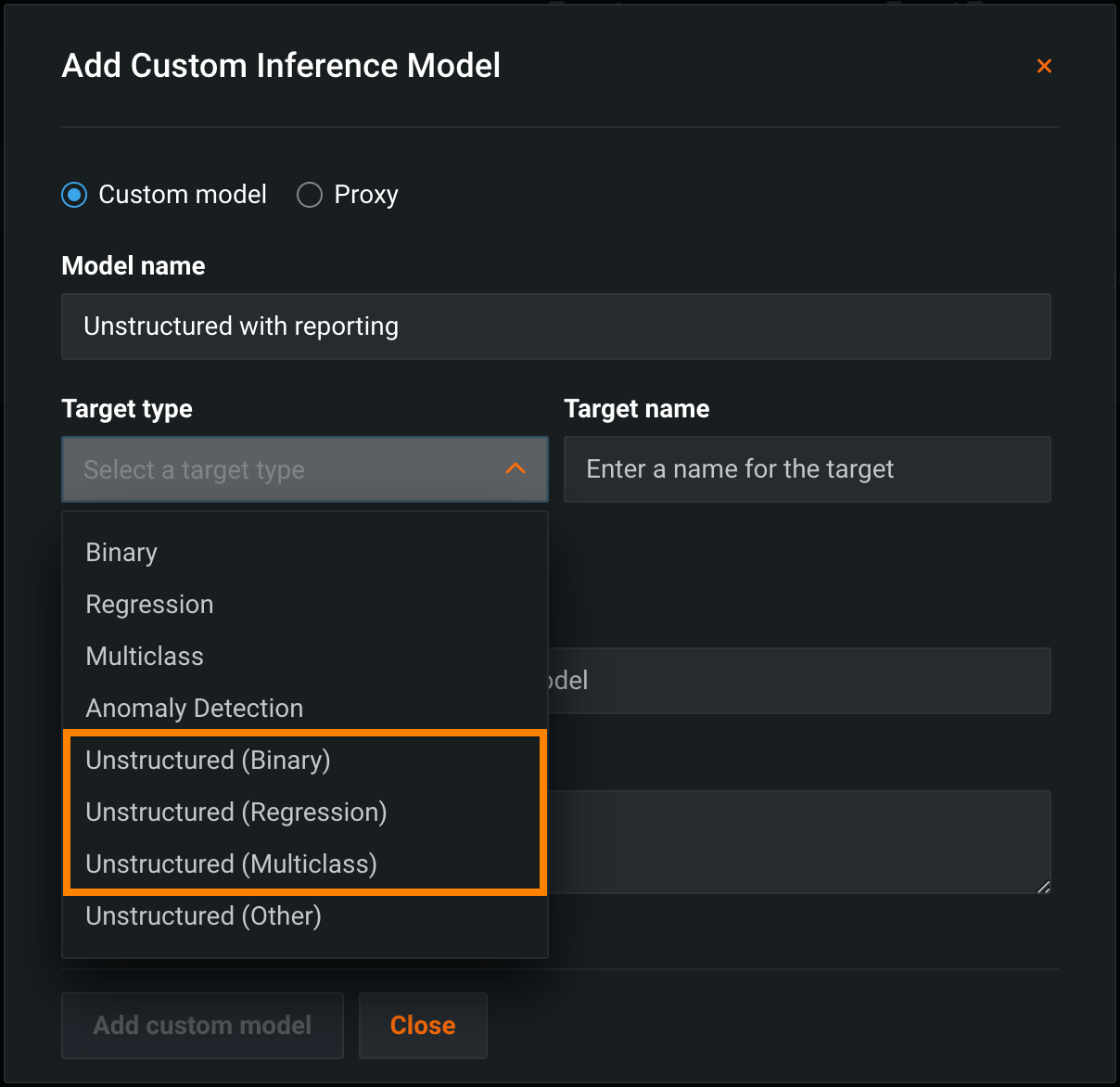MLOps reporting for unstructured models¶
Availability information
MLOps Reporting from Unstructured Models is off by default. Contact your DataRobot representative or administrator for information on enabling this feature.
Feature flag: Enable MLOps Reporting from Unstructured Models
Now available for preview, you can report MLOps statistics from Python custom inference models created in the Custom Model Workshop with an Unstructured (Regression), Unstructured (Binary), or Unstructured (Multiclass) target type:
Target type consideration
MLOps reporting for unstructured models is not supported for the Unstructured (Other) target type.
With this feature enabled, when you assemble an unstructured custom inference model in Python, you can read the mlops input argument from the kwargs as follows:
mlops = kwargs.get('mlops')
For an example of an unstructured Python custom model with MLOps reporting, see the DataRobot User Models repository.
Unstructured custom model reporting methods¶
If the value of mlops is not None, you can access and use the following methods:
report_deployment_stats¶
Reports the number of predictions and execution time to DataRobot MLOps.
report_deployment_stats(num_predictions: int, execution_time: float)
| Argument | Description |
|---|---|
num_predictions |
The number of predictions. |
execution_time |
The time, in milliseconds, that it took to calculate all predictions. |
report_predictions_data¶
Reports the features, along with their predictions and association IDs, to DataRobot MLOps.
report_predictions_data(features_df: pandas.DataFrame, predictions: list, association_ids: list, class_names: list)
| Argument | Description |
|---|---|
features_df |
A dataframe containing all features to track and monitor. Exclude any features you don't want to report from the dataframe. |
predictions |
A list of predictions.
|
association_ids |
(Optional) A list of association IDs corresponding to each prediction. Association IDs are used to calculate accuracy and must be unique for each reported prediction. The number of predictions should equal the number of association_ids in the list. |
class_names |
(Classification only) A list of the names of predicted classes (e.g., ["class1", "class2", "class3"]). For classification deployments, the class names must be in the same order as the prediction probabilities reported. If the order isn't specified, the prediction order defaults to the order of the class names on the deployment. This argument is ignored for regression deployments. |
Local testing¶
To test an unstructured custom model with MLOps reporting locally, you must use the drum utility with the following input arguments (or the corresponding environment variables):
| Input argument | Environment variable | Description |
|---|---|---|
--target-type |
TARGET_TYPE |
Must be unstructured. |
--webserver |
EXTERNAL_WEB_SERVER_URL |
The DataRobot external web server URL. |
--api-token |
API_TOKEN |
The DataRobot API token. |
--monitor-embedded |
MLOPS_REPORTING_FROM_UNSTRUCTURED_MODELS |
Enables a model to use MLOps library to report statistics. |
--deployment-id |
DEPLOYMENT_ID |
The deployment ID for monitoring model predictions. |
--model-id |
MODEL_ID |
The deployed model ID for monitoring predictions. |
